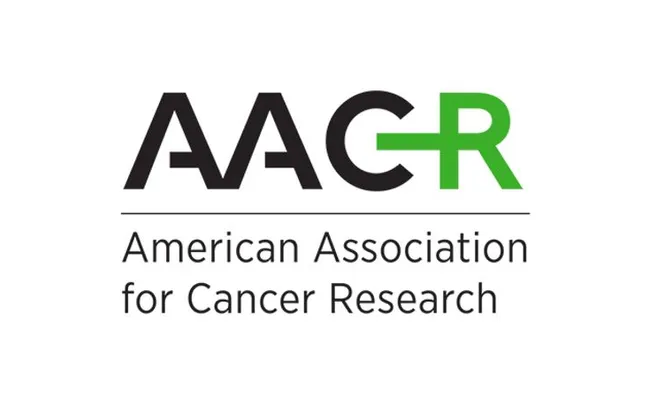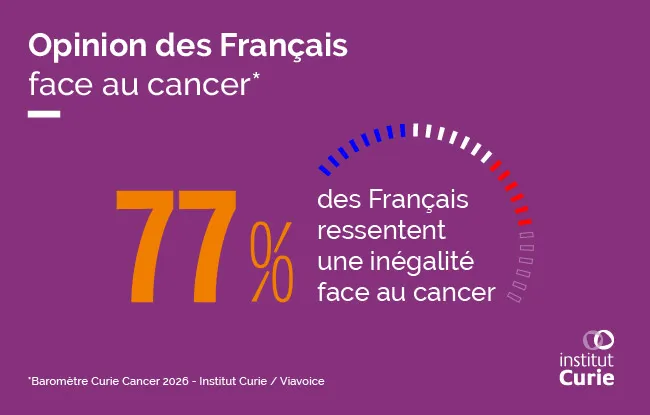- Home >
- Institut Curie News >
- Institut Curie’s latest progress at the AACR Annual Meeting 2023
The essential event for international research in oncology, the AACR Annual Meeting is an opportunity for discussion and sharing progress in our fight against cancer. Institut Curie has the unique opportunity this year to showcase its expertise in immunology, genomics and epigenetics, as well as its distinctive research-care continuum model, particularly in pediatrics, in ENT tumors and in cancers of unknown origin
Announces Prof. Alain Puisieux, Director of the Institut Curie Research Center.
Research in pediatric oncology: Institut Curie in the spotlight
At the AACR Annual Meeting, Dr. Olivier Delattre, director of Institut Curie’s SIREDO center (Care, Innovation & Research in Childhood, Adolescent and Young-Adult Oncology) and of the Cancer, Heterogeneity, Instability and Plasticity unit (Inserm, Institut Curie) receives the AACR-St. Baldrick's Foundation Award 2023 for his commitment and important research in pediatric cancer and for the significant clinical implications of his discoveries.
Dr. Olivier Delattre’s work is internationally recognized and has paved the way for new therapeutic options in pediatric cancers, by improving the accuracy of molecular diagnoses. He was the first to characterize EWS-FLI1 chromosomal translocation from a molecular standpoint in Ewing’s sarcoma, today essential for accurate diagnosis and treatment of this cancer. Dr. Olivier Delattre has also helped identify other genetic alterations in different pediatric cancers (BCOR-CCNB3 translocation in certain sarcomas, SMARCB1 mutations in rhabdoid tumors, ALK mutations in neuroblastoma, etc.). His research led him to identify the genes predisposing to tumors for neurofibromatosis type 2 (a condition that causes tumors to develop in the central nervous system), neuroblastoma and a syndrome predisposing to rhabdoid tumors. These discoveries have helped us better understand predisposition to cancer in children. More recently his work on identifying neogenes in Ewing sarcoma has paved the way for development of brand-new therapeutic approaches in pediatric cancers.
Dr. Olivier Delattre is a pediatric oncologist and Inserm research director, as well as member of the AACR since 2015. He has received a number of prizes and awards, and very recently received the Grand Prix Inserm 2022.
Dr. Olivier Delattre will give a talk entitled "Ewing sarcoma, a paradigm for cell reprogramming in cancer" on April 18, 2023
Childhood and adolescent cancers: a promising boost for innovation
Each year in Europe around 35,000 new pediatric cancer cases are diagnosed. Although the five-year survival rate is 80%, the development of new molecules and the identification of therapeutic innovations in pediatrics that have been proven their effectiveness in adults are crucial challenges.
Within this context, around a dozen public and private European centers specializing in pediatric oncology - including Institut Curie - have been partnering for almost 4 years with the ITCC-P4 Innovative Therapies for Children with Cancer Pediatric Preclinical Proof-of-concept platform, financed by the European Union. The goal is to acquire close to 400 preclinical models to better understand the biology of pediatric cancers, identify predictive biomarkers and test new molecules. Several projects within the ITCC-P4 and co-led by Dr. Gudrun Schleiermacher, pediatrician and researcher at Institut Curie, in the Cancer, Heterogeneity, Instability and Plasticity unit (CHIP, Institut Curie - Inserm) are being presented at the AACR Annual Meeting 2023.
Using state-of-the-art genomics analyses, different tumor sub-types have been discovered and very specific molecular profiles revealed, particularly with sarcoma and neuroblastoma. Other research highlights alterations in terms of number of copies on the DNA, enabling much more accurate classification into sub-groups. Furthermore, the researchers managed to uncover predictive biomarkers as well as potential new therapeutic targets.
Posters presented at the session:
- Innovative Approaches for Tumor Profiling and Data Analysis on April 16, 2023: “ITCC-P4: Genomic profiling and analyses of pediatric patient tumor and Patient-Derived Xenograft (PDX) models for high throughput in vivo testing”
- Pediatric Cancer session 3: Genomes and Novel Tumor Models on April 18, 2023 “The ITCC-P4 sustainable platform of fully characterized PDXs supports the preclinical proof-of-concept drug testing of high-risk pediatric tumor models.”
Cancers of unknown origin: improving diagnostic and therapeutic care, partly using artificial intelligence
Cancer “of unknown primary” and “of unknown origin” refers to cancer that is discovered due to the presence of metastases, meaning when the illness has spread to other tissue, where the initial affected organ cannot be identified. This type of cancer accounts for 2 to 3% of all cancer cases (approximately 7,000 patients per year in France), and is particularly challenging to treat.
In 2019, along with her colleagues, Dr. Sarah Watson, medical oncologist and researcher in Institut Curie’s Cancer, Heterogeneity, Instability and Plasticity unit (CHIP, Institut Curie - Inserm) developed the first method that is effective, reproducible, and useable in clinical routine to help identify the origin of these cancers. Using the new-generation RNAseq sequencing technique (to sequence all genes expressed in a tumor), the researchers drew up a “diagnostic classifier” (TransCUPtomics) based on expression profiles of over 20,000 tumors and normal tissue. They then succeeded in developing a deep-learning algorithm that learnt to successfully match a given RNA profile to a specific organ or tissue, whether cancerous or not.
Since 2020, as part of the Medicine France genomics 2025 program, the scientific coordination unit in Institut Curie’s Early Clinical Trials (D3i) department, headed by Prof. Christophe Le Tourneau, head of the department, is coordinating the national multidisciplinary consultation meeting (MCM) dedicated specifically to cancers of unknown origin. This MCM aims to discuss the diagnostic, prognostic and therapeutic treatment of patients with cancer of unknown origin, using state-of-the-art pathological and molecular analyses, as well as the dedicated AI tool TransCUPtomics. A study carried out on 76 patients for whom long-term monitoring was available finds a significant diagnostic and therapeutic benefit of this MCM throughout France for patients suffering from cancer of unknown origin.
Poster presented at the session “Spatial Profiling, Tumor Classification, and Response Assessment” on April 18, 2023: “National Multidisciplinary Tumor Board improves diagnostic stratification and therapeutic management in Cancers of Unknown Primary: the French Experience"
Exploring the utility of circulating tumor DNA in ENT cancers
The work carried out as part of the science thesis of Dr. Grégoire Marret, a medical oncologist in Institut Curie’s Early Clinical Trials (D3i) department, and in collaboration with OncoDNA, a Belgian company specialized in precision medicine, involved analyzing circulating tumor DNA in ENT cancer patients monitored in the SCANDARE study[1]. The researchers were able to identify mutations not found in tissue biopsies in the circulating blood, as well as alterations of the tumor genome over time. These findings suggest that ENT cancers can be diverse within a tumor in the same patient, in terms of space and time. The study found that the presence of circulating tumor DNA in patients who had undergone surgery for their cancer could precede a recurrence. Tracking the circulating tumor DNA would help better identify these patients at risk of relapse, in order to monitor them and adapt the intensity of post-surgical treatment.
Poster presented on April 17, 2023, at the “Liquid Biopsies” session: Circulating Nucleic Acids and Circulating Tumor Cells 3: “Spatial and longitudinal tumor heterogeneity in head and neck squamous cell carcinoma patients treated with primary”
Dr. Grégoire Marret will receive an award for young researchers (ACR-Margaret Foti Foundation Scholar-in-Training Award), recognizing the quality of his work as part of his Thesis of Science supervised by Prof. Ivan Bièche and Prof. Christophe Le Tourneau, as well as Maud Kamal from Institut Curie.
Educational Sessions
Sessions held throughout the meeting addressing important research topics, with presentations given by world experts.
► Dr. Hélène Salmon, head of the Stroma and Immunity team at Institut Curie in the Immunity and Cancer unit (Institut Curie, Inserm), will jointly lead the session devoted to T cell immunotherapy approaches in “cold” tumors (not invaded by the immune cells). Despite the clinical success achieved with checkpoint inhibitors, many cancer patients do not respond well to immunotherapy. This is especially true for immunologically “cold” tumors, characterized by small numbers of T cells infiltrating the tumors or by an accumulation of T cells in the immune microenvironment. This session will reveal several mechanisms operating and triggered by the tumor cells, as well as the therapeutic strategies being considered to counteract this phenomenon.
Educational session “T Cell Therapies in Immunologically Cold Malignancies” on April 14, 2023
► Dr. Gudrun Schleiermacher, pediatrician and researcher at Institut Curie in the Cancer, Heterogeneity, Instability and Plasticity unit (CHIP, Institut Curie - Inserm) will report on liquid biopsies in pediatric cancer: how to implement better monitoring using circulating biomarkers, in addition to imaging and clinical activity? How can these analyses be used to target certain genes, for example ALK in neuroblastoma?
Educational session "Liquid Biopsies for Detection and Monitoring: Challenges and Opportunities” on April 14, 2023
► Dr Céline Vallot, head of the Dynamics of Epigenetic Plasticity in Cancer team at Institut Curie in the Dynamics of Genetic Information: fundamental bases and cancer unit (Institut Curie, CNRS, Sorbonne University) takes part in a special session on the theme “Decoding the origins of drug resistance phenotypes in cancer.” Primary or acquired drug resistance is a major cause of therapeutic failure in cancer patients. Dr. Céline Vallot will specifically address the recent discoveries concerning the epigenetic mechanisms underlying these treatment resistance phenomena. .
Session “Decoding the Origins of Drug Resistance Phenotypes in Cancer“ on April 18, 2023
Also on the agenda
-
Therapeutic vaccines/Poster “A randomized phase II trial of TG4001 plus avelumab versus avelumab alone in recurrent/metastatic (R/M) human papilloma virus (HPV)-16 positive anogenital cancers” Christophe Le Tourneau, Frédéric Rolland, Amaury Daste, Philippe Cassier, Sébastien Salas, Luis Manso Sánchez, Gerardo Colon-Otero, Lauriane Eberst, Olivier Lantz, Ana Lalanne, Annette Tavernaro, Hakim Makhloufi, Kaïdre Bendjama, Maud Brandely, Jean-Pierre Delord.
Session Phase II and Phase III Clinical Trials in Progress on April 17, 2023
- Liposarcoma/Poster "Integrated molecular analysis of human dedifferentiated liposarcoma identifies a population of liposarcoma progenitors vulnerable to TGF beta inhibition” Nadège Gruel, Chloé Quignot, Julien Vibert, Sylvie Bonvalot, Sophie El Zein, Dimitri Tzanis, Sylvain Baulande, Odette Mariani, Joshua Waterfall, Olivier Delattre, Sarah Watson
Session Tumor Heterogeneity 1 - April 16, 2023
- Breast cancer/Poster “Alpelisib in combination with trastuzumab and pertuzumab as maintenance therapy in patients with HER2+, PIK3CA-mutant advanced breast cancer: EPIK-B2 Study Part 1 safety and efficacy results” – Sara A. Hurvitz, François-Clement Bidard, Wei Li, Xichun Hu, Sonia Pernas, Joseph Thaddeus Beck, Mario Campone, Kevin Punie, Michelle Miller, Mathilde Kaper, Yu Han, Farhat Ghaznawi, Guy Jerusalem
Session Novel Antitumor Agents, PI3K/AKT Inhibitors, Proteasome Inhibitors, and Topoisomerases, April 18, 2023
KEY POINTS
Pediatrics/Dr. Olivier Delattre wins the prestigious AACR-St. Baldrick's Foundation Award 2023 for his commitment and important research in pediatric cancer.
Cancers of unknown origin/Improving diagnostic and therapeutic care, partly using artificial intelligence
Liquid biopsies/Exploring the clinical utility of circulating tumor DNA in ENT cancer
[1] SCANDARE is a prospective study in which tumor and blood samples are collected for translational research in ovarian cancer, triple negative breast cancer and ENT cancer. Its goals include understanding tumor diversity, the role of the immune environment, and the characterization of sensitivity biomarkers and biomarkers of resistance to cancer drugs.



